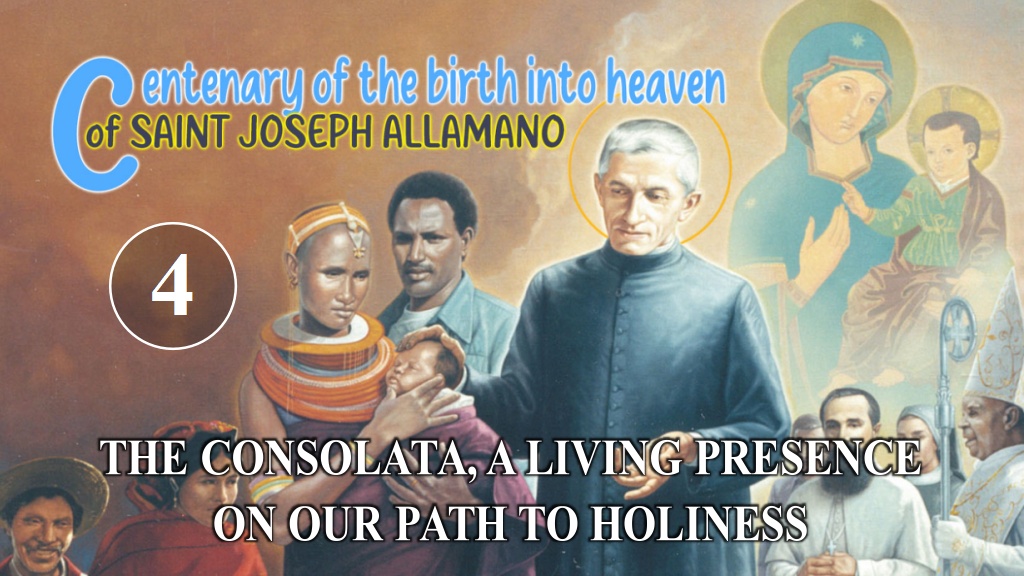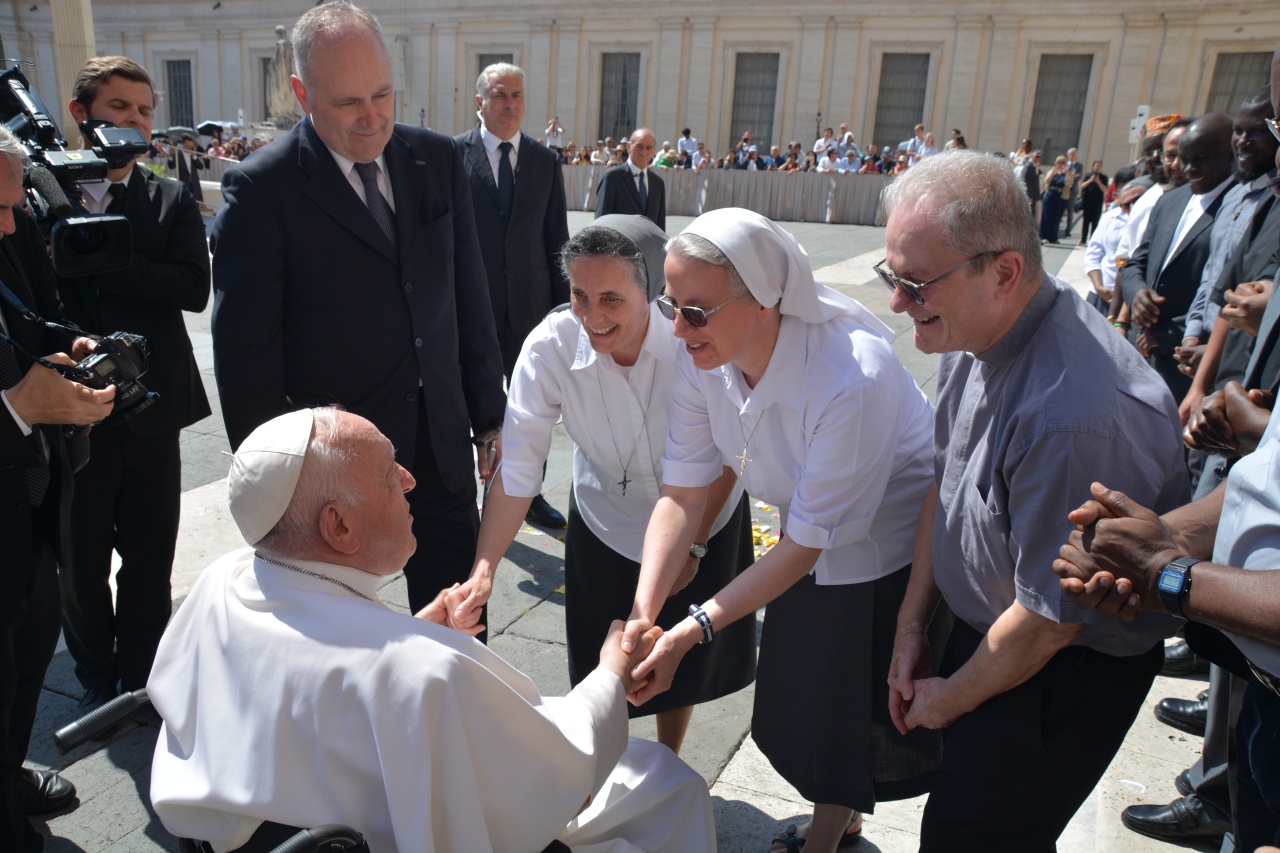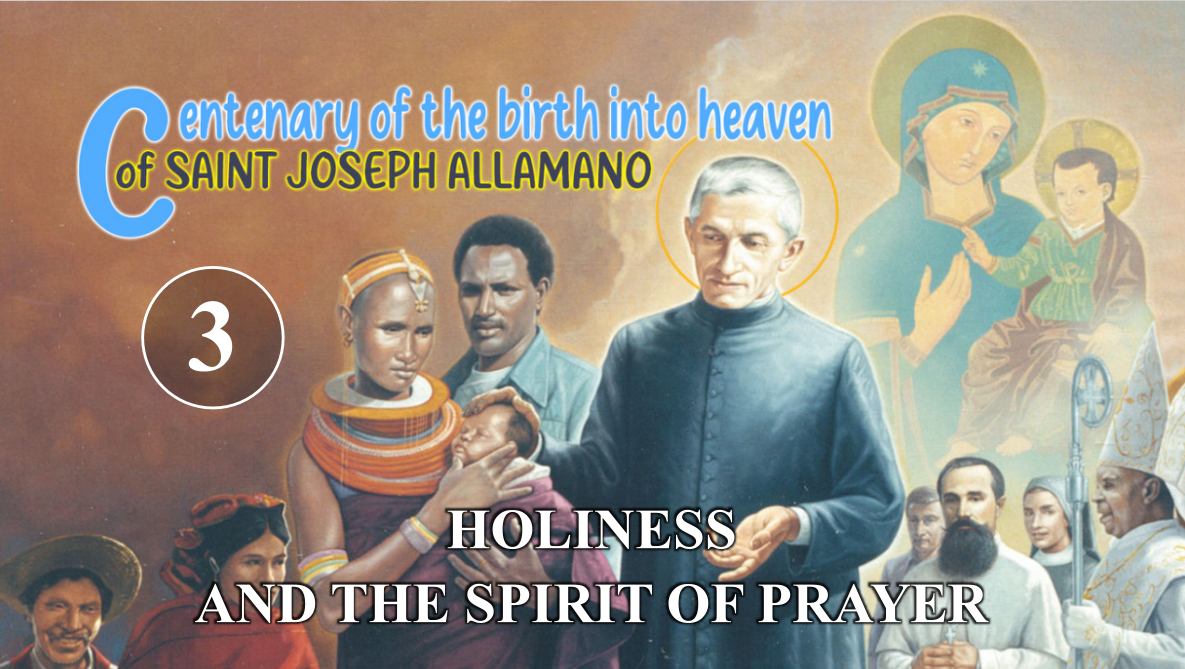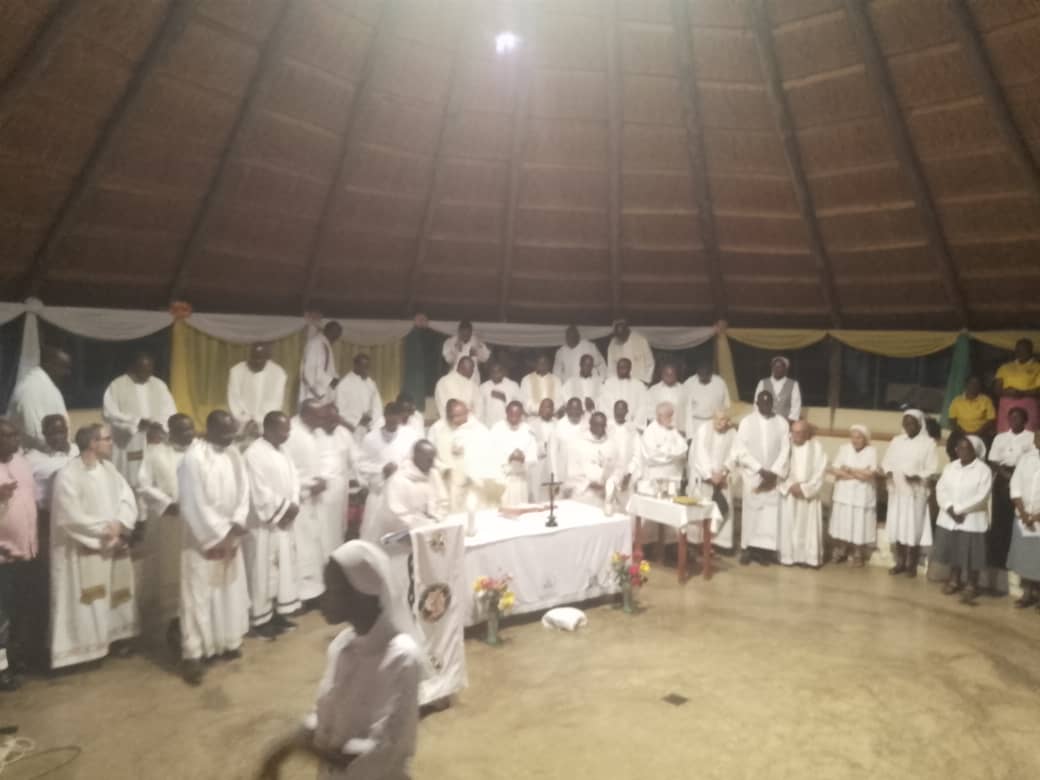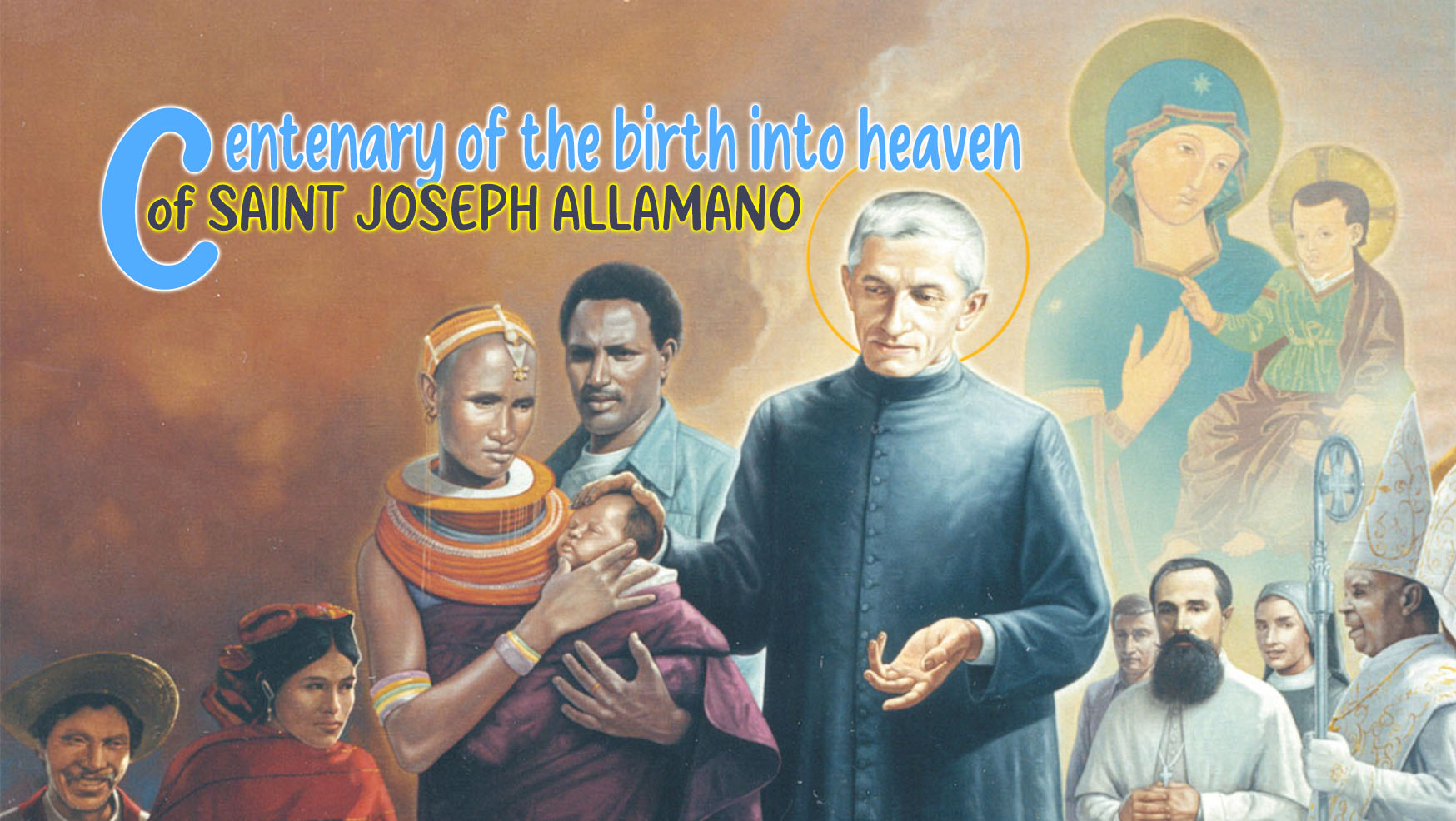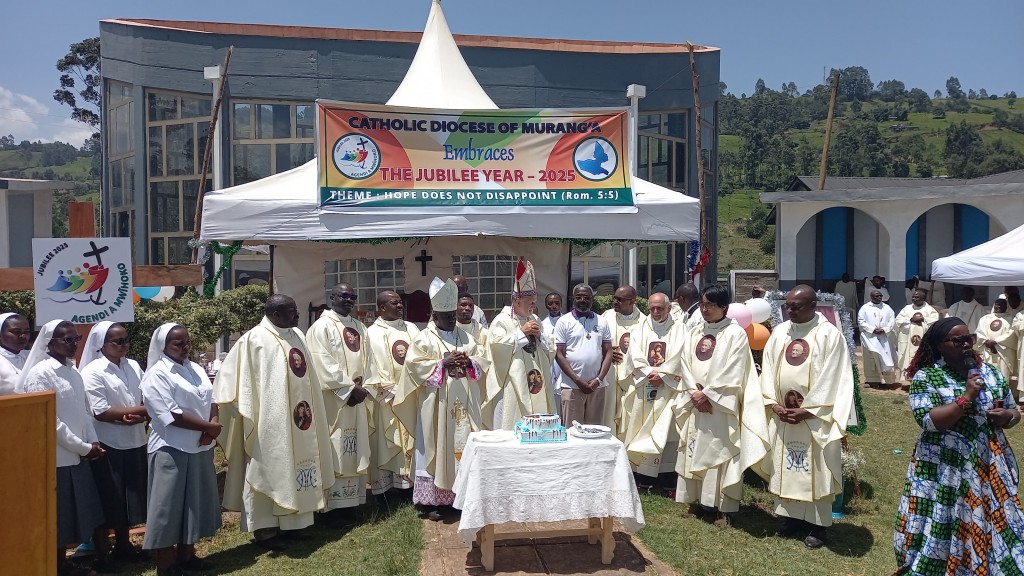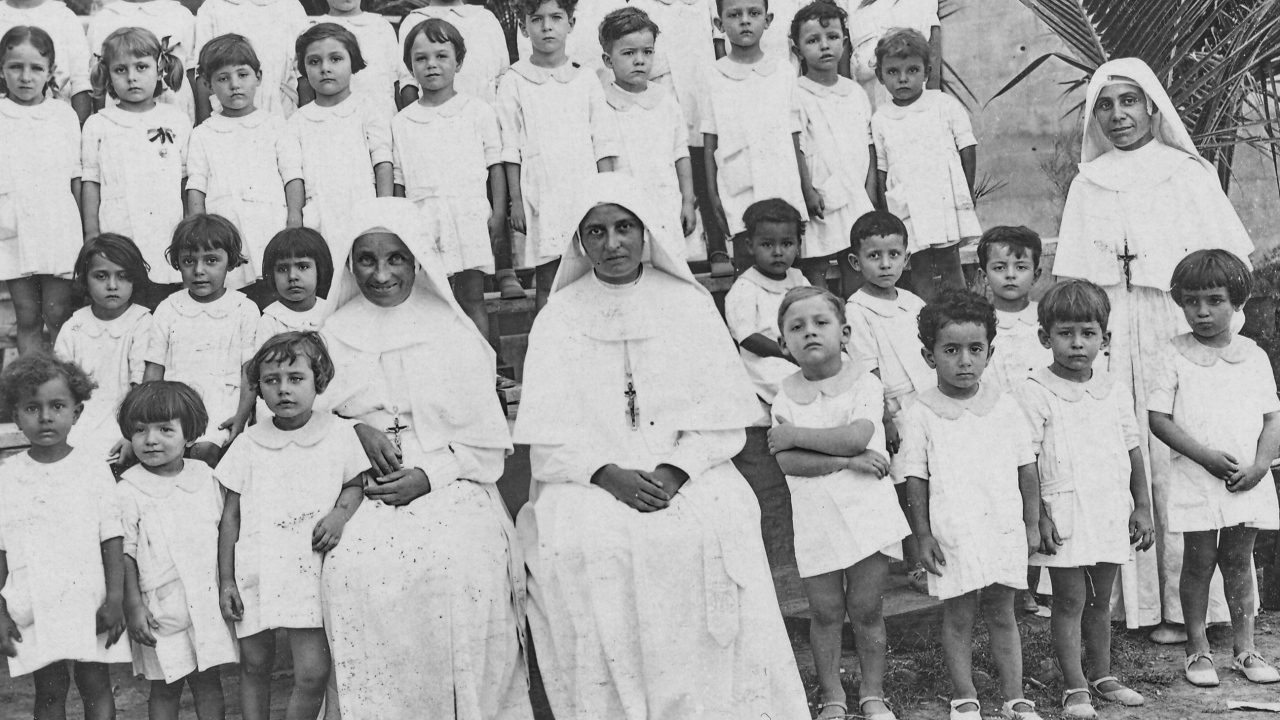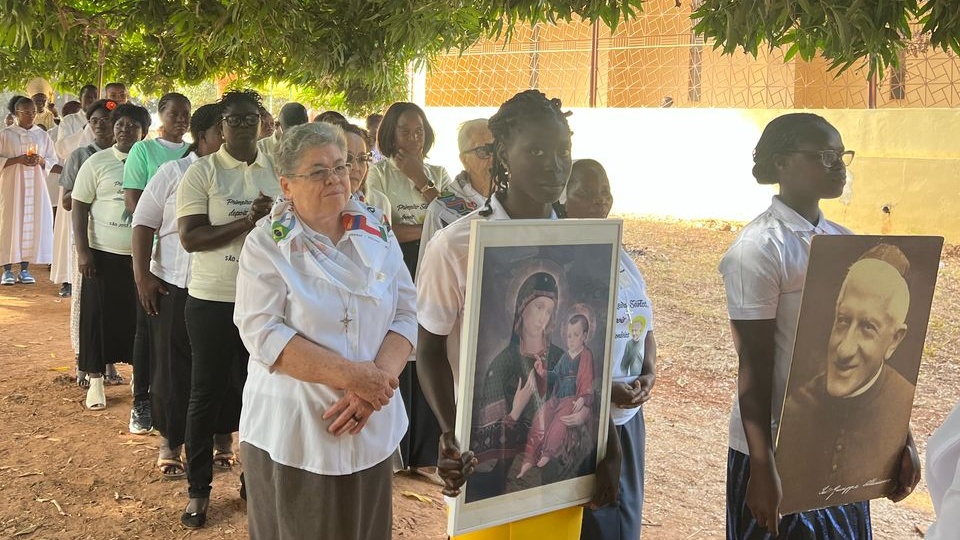Towards the Centenary of the birth into Heaven of Saint Joseph Allamano, a new reflection about Saint Joseph Allamano and the Consolata’s living presence Mary with the Community awaits the gift of the Holy Spirit “You will receive the power of the Holy Spirit which will come upon you, and then you will be my witnesses not only in Jerusalem but throughout Judaea and Samaria, and indeed to earth’s remotest end.” (Acts 1:8) The gift of the Holy Spirit promised by Jesus is poured out on the community that has encountered the Risen One and now makes it a witness, a missionary of the joy of the Gospel, in Judaea, Samaria and in all the ends of the earth. “After the resurrection, it is up to them to carry on this mission, to cast their nets again and again, to bring the hope of the Gospel into the “waters” of the world, to sail the seas of life so that all may experience God’s embrace. “ A mission entrusted to the Church and to us today, at this juncture of history, with an infinite need to hear the Word that saves and revives hope. Mary, the Mother, was there, amid the community, gathered in prayer and waiting for the Spirit (cf. Acts 1:14). She who knows well his strength and his action from when, at the Annunciation, he enveloped her in His shadow and made her Mother (Lk 1:35). “Between her and the Holy Spirit there is a unique and eternally indestructible bond which is the very person of Christ, ‘conceived by the power of the Holy Spirit and born of the Virgin Mary’”. She, the woman of the YES to God, with unshakable fidelity and trust, renews her Fiat, always, in every circumstance, in happy and sad events, when God’s plan appears clear and when it is less comprehensible and she can do nothing but keep it in her heart, when her step becomes light and leads her quickly to meet the other and when she remains firm, nailed to the cross of her Son, in the deepest and most excruciating pain and finds herself still asked to become Mother, a womb that generates a new humanity that is born from the pierced heart of Jesus. It is the hour of the Son and there the Mother is present. Her life was a perennial YES to God’s will for her. The Consolata leads us to Jesus St. Joseph Allamano said that “before being Consoled (Consolata), Mary had been the Sorrowful“. She lived the passion and death in profound communion with Jesus and in the mystery of the Resurrection she was fully Consoled. Consolation is a gift of the Spirit, the Comforter, continually present in the heart of Mary, the true dwelling place of God. We understand why Mary, the Consolata, who knows God and knows God’s ways, is our sure guide on the path that leads to Him. Allamano said: “You must be saintly proud to be under the protection of the Consolata; to bear the name of Our Lady and this must push you to make yourselves what you must be. You must bear your name well and have a high devotion to Our Lady. All the Saints were devoted to Our Lady: it is a sign of predestination.” Let us listen to her voice, sweet and reassuring, which tells us again: “Do whatever He tells you” (Jn 2:5). She invites us not to be afraid, to open our hearts to God, to become fertile ground where God makes us capable of bearing abundant fruits of life. Women and men of God who live a process of transformation that makes us transparent witnesses of God’s love, therefore, truly missionaries in all aspects. People no longer with our gaze turned downwards, centred on ourselves, in the narrow and confined spaces where an increasingly demanding “I” tries to lock us up. It is the Spirit who comes like an impetuous wind, in a new Pentecost, enters closed spaces, crosses the armoured doors and opens us to the light and warmth of the Love that saves. It makes us free people, capable of recognizing how God visits us today, visits our world shrouded in darkness, anguish and pain. “How many times did Joseph Allamano turn his sight to the Consolata and how many times did he let himself be looked at by Her! We too want to contemplate her face and let ourselves be looked at by Her, here lies our strength.” The Consolata, our Most Tender Mother The month of June this year is a particularly charged month full of grace, a gift from God. We are preparing to live Pentecost and to live the novena and feast of our mother, the Consolata, in this blessed and holy year of the Jubilee of Hope. God the Father, who loves us deeply and wants to gather humanity around Himself, who wants every son and daughter to live safely at home with Him, to know his heart and his great love for each one in particular, and is willing to reach us where we are, in the situation we live, where our path is leading, to make us know His heart and His infinite love, an unmistakable touch that makes us bounce up and follow Him on His path. Then we too will be sensitive and attentive in recognizing and fulfilling in our lives God’s will for us, which is revealed through mediations that the Lord puts on our path. And on this journey, it is so sweet and so beautiful to have the Consolata, the most tender mother, next to us. “Is not the Blessed Virgin under the beautiful title of Consolata our Mother, and we her children? … We are children of the Consolata, and most beloved children, but do we practically always show ourselves to be such, by invoking Her often, by honouring Her in as many ways as possible, and by having recourse to Her with the confidence
The Magisterium of Pope Francis and the Journey of the Consolata Missionary Sisters
Twelve years is a significant period of time in which choices and trajectories are consolidated or new paths are built towards new horizons. This is true for a religious Congregation such as that of the Consolata Missionary Sisters, and it is also true for the Church, which from 2013 to 2025 was guided by Pope Francis. In this article we reflect on the contribution of the Supreme Pontiff to the reflection and concrete choices that our Institute has made in these years of Pontificate. But first, a small premise: “YOU ARE THE POPE’S SISTERS” Great is the affection, and at this moment the emotion, towards Pope Francis. But our Institute has always had a particular relationship with the Holy Father. Starting with Pius X, to whom we owe the foundation of the Institute: according to the testimony of Saint Joseph Allamano, our founder, it was the Pope who encouraged him: Then, but much later, you came, but you belong to the Pope. Once when I spoke to him about this new foundation he said to me: It must be done. – And when I added that I believed I did not have the vocation for this, he replied: If you do not have it, I will give it to you. – And here are the Sisters. (Conference to the Sisters, April 20, 1922) On other occasions, the Founder exhorted full obedience to the Pope, even in the smallest desires: A characteristic of the missionary must be full submission to the commands not only, but even to the smallest desires of the Pope (Conference to the Sisters, August 30, 1914). And he used to say: you are “papaline” to indicate complete availability and loyalty in the service of the Church and the Pope. MUCH LIFE AND MANY STEPS TAKEN The period from 2013 to 2025 was rich in events and journeys for the Institute. We list the most important: And yet, the Institute of the Consolata Missionaries finds itself in a process of aging and reduction, as happens to many congregations. How was all this possible? There are some intuitions of Pope Francis that have been LIGHT and ENCOURAGEMENT to us. Here are some: THE PERIPHERIES AND THE OUTGOING CHURCH Pope Francis’ first apostolic exhortation, Evangelii Gaudium (2013), presented a leitmotif that would accompany his entire Pontificate: going to the peripheries, both geographical and existential: Today, in this “go” of Jesus, the ever-new scenarios and challenges of the evangelizing mission of the Church are present, and we are all called to this new missionary “going forth”. Every Christian and every community will discern which path the Lord asks, but we are all invited to accept this call: to leave our own comfort zone and have the courage to reach all the peripheries that need the light of the Gospel (n.20). The “outgoing” Church is a Church with open doors. Going out to others to reach the human peripheries does not mean running towards the world without direction and without meaning (n.46). In the rereading of our Charism and our apostolic choices, the word “periphery” reflects the option: The consolation that, charismatically, we are called to bring, refers clearly to the existential peripheries and to the service of encounter, presence and listening. LITTLENESS During his visit to Kazakhstan (2022), Pope Francis expressed himself as follows: Littleness humbly delivers us to the power of God and leads us not to base ecclesial action on our abilities. And this is a grace! I repeat there is a hidden grace in being a small Church, a small flock; instead of showing off our strengths, our numbers, our structures and every other form of human relevance, we let ourselves to be guided by the Lord and we place ourselves humbly alongside people. Rich in nothing, poor in everything, we walk with simplicity, close to the sisters and brothers of our people, bringing into life’s situations the joy of the Gospel ‘Ratio Missionis’ of the Institute, a document that outlines the specific mission of the Consolata Missionary Sisters, refers to this intuition of Pope Francis, as a perspective of the mission of today and of the future. littleness is not the result of a particular historical situation, such as a decrease in personnel. It is a choice: first of all, it is the choice of God, His style, and for the mission today it is a very significant option of closeness to the people, of simplicity, of poverty that entrusts itself to divine providence and enjoys the joy of the gospel. THE FIRE OF EMBERGS An image used with a certain frequency by Pope Francis is that of fire. It is a symbolism very familiar to the Consolata family, because Saint Giuseppe Allamano used to repeat: “It takes fire to be an apostle!” and warned against distinguishing the fire that comes from an energetic temperament, from the true fire, which is fuelled by the love of God, and which is transmitted to those who know the Lord for the first time. At the beginning of the Synod for the Amazon, the Pontiff stated: The gift we have received is a fire, it is a burning love for God and for our brothers. The fire does not feed itself, it dies if it is not kept alive, it goes out if the ashes cover it. If everything remains as it is, if our days are marked by “it has always been done this way,” the gift vanishes, suffocated by the ashes of fears and the concern to defend the status quo. The last General Chapter (2023) also used this image in its title: “The fire of the mission.” In the greeting message intended for the Chapter assembly, Cardinal Pietro Parolin, on behalf of the Holy Father Francis, addressed in these words: The Holy Father Francis is happy to send his cordial greetings of best wishes. He hopes that this important event will revive in each one sincere intentions of generous adherence to Christ and rekindle “the fire of the mission.” But there is a particular
Holiness and the spirit of prayer
Towards the Centenary of the birth into Heaven of Saint Joseph Allamano, a new reflection about Saint Joseph Allamano and the spirit of prayer “One day, a young man went to look for work among the lumberjacks. The manager, after checking the young man’s physical appearance, immediately accepted and told him to come back the following day. On the first day of work, the young man cut down many trees. On the second day, the number of trees instead decreased, even though he put the same effort and dedication of the previous day. On the third day, the young man worked even harder, and yet he managed to cut just very few trees… The manager, after noticing such a steady drop in his performance, asked him when he had sharpened his axe last time. The young man confessed that he was taken up so much by his job that he forgot to sharpen his axe…” Today’s world is so fast and hectic that it is very hard to stop to regain our strength and we run the risk of losing sight of the most important aspects of our missionary life. If we compare prayer to the axe of the lumberjack, then the story teaches us about the importance of keeping our prayer life always “very sharpened” to help us in everything we do in our life. Pope Francis himself reminds us that prayer can’t be just any prayer, because “prayer is like the oxygen of life, it serves to attract to us the presence of the Holy Spirit who always pushes us forward.” Prayer, therefore, is the most important tool we have to get in touch with God, and to get familiar with Him, so much so that we can apply to ourselves the words of St. John: “That which was from the beginning, that which we have heard, that which we have seen with our eyes, that which we have beheld and that which our hands have touched, that is, the Word of life…, whom we have seen and heard, we proclaim also to you” (1 Jn 1:1-3). For St. Joseph Allamano prayer ia a priority: “Yes, yes, work; but prayer is more necessary than anything else. First we must sanctify ourselves, first pray, then do good to others. We must love prayer! Blessed are you if you strive to progress more and more in the interior life, in a spirit of recollection and prayer.“ Yes, pray, pray well! Allamano not only encourages us to pray a lot, but he also wants to teach us how to do it well! Such a teaching of his comes from his profound personal experience of encountering Jesus in prayer. It’s really singular how he describes the commitment we ought to have whenever we pray: “We have to pray well, because praying badly is an insult to the Lord, so it’s better not to do it […] because it is disrespect for the Lord. This does not mean that we should give up praying when we do not feel like … instead we should change our attitude so that our prayer turns out to be enriching and fruitful. We are aware of so many different proposals and ways of spirituality that can inspire prayer life, but we know as well that St. Joseph Allamano has his own suggestions to help us pray well. Before praying, we should prepare ourselves, by getting rid of any thought that can distract and disturb us. “The presence of God prevents dissipation and keeps the practices of prayer interconnected, which otherwise would be like oases, outside of which everything is sterile.“ It is important, first of all, to focus on the words we pronounce as we pray so as to avoid praying in a hurry and then to reflect on the meaning of the words to nurture a preparatory inner attitude to our prayer. It is necessary to be in tune with God and focused ourselves on Him: “Think that I speak with the Lord; Do your prayers well, from the heart.” To pray well, it is necessary to have a very mindful attitude: “In a position of respect, without worrying about anything else.” However, this does not mean that we must stop what we are doing to pray, because “we can pray and work, as long as work allows us to think and that prayers are not strictly mandatory. Jesus also prayed while he worked in his workshop in Nazareth.” Unfailing Prayer In the book “The Spiritual Life of José Allamano”, we find very well outlined four conditions to make our prayers become unfailing and, at the same time, be reciprocated: Prayer continues as a way to a spirit of prayer. St. Joseph Allamano always spoke of the love for a continuous prayer, so that, on the one hand, we avoid falling into a superficial prayer and, on the other, we are helped to acquire a true spirit of prayer because ” prayer raises us to the presence of God and puts us in dialogue with Him“. Continuous prayer is nothing else that the sign of the growth of our faith and the actual proof that we cannot live without God’s presence, and thus it spurs us to walk along the paths of holiness that God has prepared for each one of us. Why should we turn our lives in a continuous prayer? Because it is such an attitude of ongoing prayer that leads us to join Saint Paul in saying: I live, but it is no longer I, it is Christ who lives in me. I live my life present in the flesh, in faith in the Son of God, who loved me and gave himself for me (Gal 2:20). There could certainly be more reflections about prayer as the fundamental pillar of Saint Joseph Allamano’s holiness, and also about our commitment to achieve and to live a true Spirit of Prayer. We hope that these few and simple reflections can mark the beginning of a inner personal
Celebrating Saint Joseph Allamano in Tanzania and Djibouti
In Tanzania On Friday, 21st February 2025, we the Consolata family present in Tanzania, that is MC, IMC & LMC celebrated the feast of our founder St Allamano and inauguration of the centenary of his birthday in heaven at Iringa. The celebration started with procession and the holy Mass was presided over by the General Vicar of Iringa Diocese, Fr. Paul Msombe, who in his homily emphasized on maintaining the on-going formation for those who have already been baptized and expressed his gratitude for the work of evangelization the missionaries are doing. After the holy Mass the superiors of MC, Sr Felicidade and that of IMC Fr Ciprian Mvanda had an occasion to talk to the people, and encouraged the Consolata missionaries to continue with the spirit of the Founder St Joseph Allamano. The two invited the General Vicar to bless and uncover the symbol of the centenary which was placed in between two candles. The words read “Kusudia, amua, na Tenda mema daima”meaning “ Wish, decide and do good always” This celebration comes at the moment in which all the Consolata Missionary Sisters in Tanzania are having their assembly. It was enriched by the family spirit, sons and daughters celebrating the Sainthood of their Founder in a joyful and animated way. Thereafter followed the sharing of meals with hearts full of thanksgiving, joy and hope. St Joseph Allamano pray for us! Sr Stella Mwinuka, mc In Djibouti On 16th February, in a small Christian community of Ali Sabieh we had the opportunity to celebrate the feast day of our beloved Founder and Saint, Joseph Allamano. This marks 99 years since he was born in heaven. The Holy mass was presided by Rev. Fr Edward Keraka, a Diocesan priest. The homily reflected the spirit and the teachings of St. Allamano, that invited and encouraged us to be Consolatas according to the name we bear. We celebrated in a climate full of simplicity and family spirit in which we were grateful for the gift of Saint Allamano to us and to the whole Church. Sr Grace Kemunto, mc
Holiness and the Eucharistic dimension of life
Towards the Centenary of the birth into Heaven of Saint Joseph Allamano, a new reflection about Saint Joseph Allamano and the Eucharist. At the hour when he returns to the Father, Jesus chooses to remain in tangible communion with his own through the Eucharistic Bread, blessed and broken, food on the journey towards the Father. “At the culmination of his life, he … breaks himself apart at the Passover supper with the disciples. In this way Jesus shows us that the aim of life lies in self-giving, that the greatest thing is to serve. And today once more we find the greatness of God in a piece of Bread, in a fragility that overflows with love, that overflows with sharing.” St. Joseph Allamano and the Eucharist The experience of this unconditional love of Jesus does not leave us indifferent but warms the heart and moves it irresistibly to respond with the same love and also to become bread broken for humanity loved by God. It is the experience of St. Joseph Allamano, a love that burns inside and always sets him on a journey, with extraordinary creativity and energy, leading him to initiatives that transcend his own human possibilities, such as that of the foundation of two missionary institutes in his adulthood, accompanying them until the end of his life, so much so that he wrote in his last will: “I have lived my many years for your sake; I have given my possessions, my health and my life for you and I hope that after my death I will be your protector in heaven.” His great loves, the Eucharist and the Consolata, inspired his being and his actions. This experience does not remain hidden in the folds of his heart; he knows how to transmit it as a teacher and spiritual guide, as a father and formator, inspiring yesterday and today paths of holiness. “Let each one think of the voice of God calling him to become a saint. Every day at Communion or when you visit the Blessed Sacrament renew your determination and say to yourself: I want to become a saint, I want to become a great saint, I want to become a saint immediately. I can do it, I ought to do it, I will to do it.” And again: “If you are devoted to Jesus in the Blessed Sacrament you cannot fail to be holy.” The relationship with Jesus in the Eucharist is nourished through constant communion, every day: “Mass, Communion and the visit to the Blessed Sacrament: these are our three loves!” A relationship that digs into and gradually leads the person into a process of transformation in Christ and even to have the likeness of Jesus: “Jesus says to the apostles: ‘He who sees me also sees the Father’ (Jn 14:9), and you in turn can say: he who sees me sees Jesus!” This transformation took place in Joseph Allamano’s own life, in the way he was, in his doing, in his relationships; even his physical appearance seemed to be permeated by this communion with Christ, as attested by many testimonies of those who saw him celebrating Mass or praying in the choir, of which we report one: Canon D. Turco: “When I was a cleric and he was already a priest, I often accompanied him in the visit to the Blessed Sacrament, which was done in the parish, in the evening. I can say this: that it felt like a fragrance of faith. I don’t know how to express myself otherwise. Such was his demeanour before the holy tabernacle. I can add that I learned from him, so to speak, the living faith and love for the Eucharist. He seemed to see Jesus. After all, he himself confided it to me several times: that he had so much love for Jesus in the Blessed Sacrament.” Love for Jesus in the Eucharist found its expression in self-giving, tireless in acting without losing intimate communion with Jesus. His day revolved around Jesus, He was truly the centre, he left Him and returned to Him constantly. The Eucharistic day was divided into a time of preparation for the meeting in the Eucharistic celebration and then of thanksgiving. In this way, He extended His presence throughout the day. The same love inspired his missionary commitment. On several occasions he expressed the joy of making Jesus present in places where He was not yet known and loved: “How pleased I am that through us God is multiplying the number of Tabernacles in the world. So many new Tabernacles! They are the focus of love for us and mercy for the people. How blessed we are to have already so many in our missions. I believe, nay I am convinced, that they bring down blessings on those lands.” “I want you to be Sacramentins“ It still echoes today, loud and clear, that “I want you Sacramentins” of Joseph Allamano with charismatic intensity to become authentic missionaries and missionary sisters. We are in love with the Eucharist, the centre around which life flows, is filled with meaning, motivates self-giving and makes us a pleasing offering to the Father, bread broken and wine poured out. Let us transmit this love of the Eucharist to the people we approach. We have a beautiful example in Carlo Acutis, the young man who will be proclaimed a saint on April 27, who said: “The Eucharist is my highway to heaven.” The love experienced in the relationship with Jesus in the Eucharist leaves no room for selfish withdrawals. We must not and cannot live for ourselves, closed in horizons that are too narrow and defensive, centred on ourselves, understood in statements of our own points of view and interests. These attitudes betray the “spirit”, the charism of Joseph Allamano, who wants us to be people of broad horizons, big hearts, attentive to the needs of others, who do good well and in a superlative way, “the most” in everything. Pope Francis reminds us of this: “The Eucharist
History and faith intertwined in a beautiful celebration in Tuthu – Muranga diocese – Kenya
Today, history and faith intertwined beautifully as we gathered in Tuthu, Kenya—the very cradle of Catholic evangelization in the region—to celebrate the opening of the centenary (100 years) of the death of Saint Joseph Allamano. This sacred place, where the first Consolata missionaries arrived in 1902, provided the perfect setting for a deeply spiritual and memorable Eucharistic celebration. The Holy Mass was presided over by Bishop Virgilio Pante, Bishop Emeritus of Maralal, and concelebrated by Bishop Peter Makau , Bishop of the Catholic Diocese of Isiolo. Their presence added profound meaning to this milestone event, which brought together priests, brothers, and sisters and the lay missionaries of the Consolata family. As Consolata Missionaries we have a long history in Kenya. Since our foundation our main goal is to spread Christianity and help those in need. Today, the Consolata Missionaries continue to serve in various countries in the world. We are working with local communities and churches to make the seed of Christianity grow and flourish. As we launched 100 years since the death of our founding father, Saint Joseph Allamano, we are called to remain committed to our mission. We keep on spreading the message of Christianity and helping those who need it most. Bishop Emeritus said it’s now time for Africans to lead the missionaries. To make our religious family to continue flourishing and going ahead producing more missionaries for foreign missions and evangelization for all non christians. It was a special and great occasion which reminded us fully of what characterizes us as Consolata Missionaries wherever we are in the world on our consecration for the foreign missions. With hearts full of gratitude and joy, we reflected on the legacy of Saint Joseph Allamano, whose missionary vision continues to shape and inspire generations. He always placed Jesus at the centre of his life and that was his driving force. The celebration was not just an event but a blessing for our institution, strengthening our commitment to mission and evangelization. By Sr. Rebecca Kemunto MC
100 years of mission in Somalia. The beginnings
The presence of the Consolata Missionaries in Somalia dates back to the time of the Founder, St. Joseph Allamano. In 1924, while greeting the first group of sisters leaving for their new mission, he told them: “Leave, go, it will not be an easy field, it doesn’t matter: work, sow, don’t wait for fruit for fifty years, then the seed will bear fruit. To our request for a painting by the Consolata, he replies: you go peacefully, that Our Lady will come, she will come.” The first Sisters left Italy on December 9, 1924 and arrived in Mogadishu on January 4, 1925. These were Sister Angelica Aschieri, Sister Silvia Coriasco, Sister Flavia Boeri, Sister Battistina Alessio. In March 1925, four other sisters from Kenya joined them: Sister Maria degli Angeli – who would be the first superior – Sister Costanza Golzio, Sister Raffaella Gerbore and Sister Adele Cullino. Faithful to the style of evangelization implemented in Kenya and approved by the Founder, the proclamation was prepared and preceded by human promotion. At the end of the first year of activity, the bulletin ‘La Consolata’ of January 1926 gave a report on the work of the mission in Somalia: “Over 500 pupils are enrolled in schools: four elementary classes, three preparatory classes and a special one for the little ones. Lessons are in the morning, afternoon and evening.” The Missionaries also dedicated themselves to assisting abandoned children or in vulnerable situations in orphanages. By the end of the year, there were already about forty little ones. A hospice was also started for the poor: the blind, the lame, the abandoned elderly and a few single mothers, with numerous offspring. The De Martino Hospital was given a new structure, both in its various departments and in the operating rooms. The patients, Somalis and Arabs, and in particular the “the women of God”, as they called them. At the Duca degli Abruzzi Village, the action of the Missionaries was twofold: religious and health care for Italian personnel, health care and school teaching for indigenous workers and members of their families who numbered more than 500 in the company, settled in different villages. The Mission Style The mission in Somalia, in a totally Muslim context, was characterized by the witness of charity and humble service to the poorest in society. The missionaries in Somalia move in a lifestyle that is modeled on that of the “Great and First Missionary of the Father” the Savior Jesus, a style that the Founder Joseph Allamano desired for his daughters; a style that makes one live in the reality of every day and in the details of every little action, according to the model: “Imitate ME who am meek and humble of heart”. The Charism given by the Founder Allamano as the only value, the only ideal, is the bouncing board towards holiness and the salvation of souls. It is a style of simplicity, humility and detachment: To seek GOD in everything: “God alone and always”. The Founder repeated to the first sisters, “Remember the purpose for which you came here, which is to work for your holiness and save many souls.” Simplicity and humility make us capable of seeing everything in God, giving serenity in obedience, strength in detachment, support in fraternal love, makes the continuous gift to one’s brothers and sisters spontaneous, gives serenity even in uncomfortable situations of deprivation and sacrifice, especially in the insecurity of tomorrow. Their way of life, “Doing good without noise,” does not attract attention, but spreads the warmth of charity everywhere. At the beginning people did not know the sisters and were distrustful, others looked at them with suspicion, sometimes they were even hostile, they were afraid and did not approach them. They have many questions about them in their hearts. If the people did not go to them, the Sisters went to the people, so they began the visits to the villages under a scorching sun, up and down the dunes, from one hut to another, in the poorest hovels, to care for the sick, to approach the dying, to give help and consolation to those in need. Several times when they arrived, the doors closed, the sick were hidden, but the sisters were not discouraged, they continued their visits with simplicity, serene, tireless, persevering. This simple, continuous, serene, fraternal methodology created trust and opened a way of penetration into the soul of the Somali people, preparing for dialogue and mutual knowledge. The first rejections, mistrust, suspicions disappeared, hostilities changed into friendship, respect and esteem for these women that people understood to be women of God. The road was now open, trust had been created and it was possible to start opening schools, hospitals, orphanages. These women of God lived and bore witness to the value of Christ’s charity, inculcating the values of life, forming entire generations, with solid principles according to the Gospel, without ever referring to Christ. To the people who looked at them with respect and esteem, the sisters offered the vision of a Gospel illustrated by the works. This people may never read the Gospel, but they will always be able to read it in the life and self-giving of each sister day after day, in simplicity and in the gift of self-giving to their brothers and sisters.
Feast of St. Joseph Allamano in Kenya
With Hearts full of gratitude This feast of this year was very special in a way, the first moment to celebrate our Father founder as a Saint. Thank you lord, we lack enough words to express our joy. Sr Lucy Karweru, Sr Angelina Njagi and Sr Rebecca Kemunto joined Saint Joseph Allamano Propadeutic formation House in celebration of the great feast of our father founder. The day started with brief talks, and welcoming entertainments from the young brothers of Saint Joseph Allamano formation house. Then Fr Charles Gachara IMC shared his missionary experience of Venezuela. Emphasizing as missionaries following the footsteps of our founding father Saint Joseph Allamano we are called to learn to listen to ourselves first to be able to listen to God. The mission is where our actions are animating the people wherever we are to be missionaries in their way of living. We should never ever say “I can do what I can ” but always say “I Will do what I am supposed to do.” After a brief moment of sharing he presided over the Holy mass and co celebrant was Fr Michael Njue. In his homily and sharing he greatly encouraged us to follow the footsteps of our father founder wherever we are first seeking our sanctity then missionary. Wherever we found ourselves for the missions we should animate God’s people with our way of Living. May Saint Joseph Allamano continue interceding for us. Then after the celebration of the holy mass the feast continued to the dining hall where we feasted to the maximum, sharing meals, drinks in a very joyous way. Immediately it followed cake cutting which marked the climax of our great day of honouring our founder. Various entertainments followed expressing our joy and gratitude for honoring our founding father as a saint. The sisters from Saint Joseph’s of Tarbes also echoed in their beautiful song of Saint Joseph Allamano. In their song, they congratulated the Consolata missionaries for the good work we are doing in the church continuing with the mission of Allamano. After various beautiful entertainment it marked our beautiful and memorable day. Sr Rebecca, mc Feast of St. Joseph Allamano in Nairobi We at Flora Hostel Chapel had the great joy to celebrate the feast of St Joseph Allamano on 16th Feb 2025. The preparations began with a nine-day Novena that culminated with the feast on Sunday the 16th. On this day we had planned to mount the new picture of Saint Joseph Allamano by removing the old one. We engaged in this exercise together with the christians in a solemn manner. The Mass began with a procession of Priests, altar servers and two of our Sisters, one carrying the new picture and the other the relic of our Saint Joseph Allamano. The singing and ullulations were clear that the presence of our founder was felt. The picture was placed at the designated place and was later mounted on the wall. The celebration of the Solemn Mass followed that was all full of singing and dancing. The prayers of the faithful were in different languages to signify the diversity of the people in the Church. The celebration took place both in the First and the Second Mass. St. Joseph Allamano, pray for us Sr Rosa Waeni MC The Feast of St Joseph Allamano in Timbwani Parish, Mombasa We are fortunate to belong to a parish named after St. Joseph Allamano. The Feast was celebrated in the level of an Outstation bearing the name of Our Beloved Saint Joseph Allamano. The Parish is under our brothers Priests, Consolata Missionaries. The Saint is at home in the presence of His Sons and Daughters. The preparations began three days before with a Triduum prior to the feast day. These three days were accompanied with prayers and teachings on Saint Joseph Allamano. On the feast day, there was a joint Mass as the Outstation is characterized by two masses on every Sunday. The celebration of the Mass presided by the Parish Priest was significant, he shared with the faithful on the Patience of St. Joseph Allamano who waited for God’s time both when he was alive and also after his death. The new picture of the Saint was mounted on the right side of the altar replacing the old one. The Mass was solemn in nature, christians were full of joy as they celebrated the first feast day of their Patron Saint. The celebration was accompanied by singing and dancing that lasted for not less than 3 hrs. After mass followed the second part in the parish hall. This was a moment of speeches from different leaders, listening to the biography of St Joseph Allamano from Sr. Mourine MC and then cake cutting and sharing. At last there was lunch and thereafter each one was free to leave. St Joseph Allamano, keep your Spirit alive among our people. Sr. Mourine MC
The Feast of St. Allamano in Guinea Bissau on 16th February 2025
The Spirit of Allamano spreads in Guinea Bissau. We the Consolata Missionary Sisters present in Guinea Bissau had a wonderful celebration of thanksgiving for the gift of St. Allamano our Founder, whose spirit and Charism has been present in this place for more than 30 years. The feast begun at around 9.30 am with the main celebrant being Bishop Jose Lambra Cá, the current Bishop of Bissau Diocese. The Christians in a procession carried the icons of Our Lady Consolata and that of St. Joseph Allamano from the main church of St. Joseph Allamano Bor to the outside grounds where the feast was prepared to take place. It was characterized by simplicity and the warmth of African people, with their dancing charms, joy and welcoming spirit which made the liturgical celebration colourful and amazing. Many people were present for the feast both the religious and the lay faithful as well as our own LMCs who joined us in this great event.After the mass we proceeded for a lunch and cake cutting. The motto “first saints then missionaries” touched the hearts of so many people, and they were so enthusiastic to know more about us. At around 4 pm people departed for their homes . Am overjoyed to celebrate the holiness of our founder. I really felt him present among us during the celebration of his feast and still offering his spirit to us. His presence has offered new strength for the mission ad-gentes especially for the young and growing church of Guinea Bissau. Here is indeed a very fertile mission field, of first evangelisation by its nature. We have a lot to carry out despite the fact that the labourers are few in God’s vineyard. The Canonization of Saint Allamano has re-energized me, offering us a new strength to serve well in our little ways guided by the quality and not the quantity as he himself teaches us. Being witnesses of Christ’s love, evangelizing through actions more than words. This is what our founder left us, that we be saints then Missionaries. St.Joseph Allamano pray for the church in Guinea Bissau! Sr. Purity, mc
Holiness and “God alone”
St. Joseph Allamano had a high idea of mission: his was not just philanthropy, volunteering, occasional commitment… Since mission is linked to the saving action of God, he considered the values of the “spirit” to be of fundamental importance. He always demanded the best from his Missionaries, especially in this aspect. Holiness was a necessity for the mission: “first saints and then missionaries”; (to the Sisters) “Being good is not enough; better is not enough; excellent!”; “Yes. God alone. Everything for God, everything from God, everything in God” (This I want you to be, p. 132). “Let’s keep our eyes fixed on high! Our aim is there: God alone!” (This I want you to be, p. 147). In the common imagination, however, the mission was thought of as doing, realizing, building, founding… Always and anytime, it was characterized by activity. Joseph Allamano instead focused heavily on “passivity”, on the acceptance of values, on being always busy in doing (the image of the “basin” he often uses in his conferences is effective). Monsignor Vacha Emilio, a priest from Turin, left the following significant testimony on the occasion of the process for the Beatification of Allamano: “In 1903, going to Rome to collect the relics of the martyr Adeodato, Can. Allamano instructed me to look for a “holy body” (bone relic) also for the Consolata Missions, but two days later he wrote to me not to worry about the famous relic anymore, because “the Saint will be found among my dear Missionaries.” That expression was not just a pious wish but reflected what Allamano’s constant concern was instead: to help his missionaries become saints. He did not want relics of saints in the Institute, but living saints! It is significant that the editors of “This I want you to be” put as the first chapter: “Holiness and mission, the aim of the Institute”. In fact, Allamano wanted holiness to come first always: “Missionaries, men and women, yes, but saints”. It was the leitmotif of all his teaching. Since there are many quotes in this regard, only one is proposed: “Some believe that being a missionary consists entirely of preaching, being on the move, baptizing, saving souls; no, no! This is only the secondary aim: we sanctify ourselves first and then others. The more holy one is, the more souls he will save” (Conf. IMC. III, 258) (his manuscript). “Everyone says that you came to become missionaries; but no: first of all, you must say: I have come to become a saint!” (Conf. IMC, III, 659). IMC Constitutions, following the Founder’s teaching, succinctly outline the path to realizing the missionary vocation: “The aim that characterizes us in the Church is the evangelization of peoples; we achieve it for the glory of God and in the sanctity of life, as understood by the Founder, when he reiterated: “First saints, and then missionaries” (5). Some characteristics of the style of holiness according to Joseph Allamano Feeling in the company of the Saints St. Joseph Allamano not only fed himself on the teachings and examples of the Saints but also wanted to give them to us as protectors or patrons. The book “Choosing flowers from flowers” by Fr. Francesco Pavese demonstrates this amply. He wanted us not only to pray to our Protectors to ask for their intercession, but that they become our models of life and inspiration in living the mission. Holiness in the plural Allamano wanted us to help ourselves become saints; also, for this reason he wanted to give us the family spirit as a characteristic of the Institute. Since the time of the Founder, the call to holiness has always resounded and continues to resonate in our Institutes. It is enough to recall the biennium on sanctity, celebrated in the years 2006-2008. Its fruit was also the beautiful publication “The Consolata missionary, saint” (2012). A strong appeal then came from our two General Directions to “make ourselves saints together”. “Holiness is not just a ‘personal affair’ nor is it just the fruit of an individual journey. Just as mission tends towards communion with God and among us, so holiness of life is nourished by communion and leads to communion; this ideal is dear to the Founder who exhorted: ‘All together we will help each other to become saints’…”. Jesus – excellent model Allamano’s sanctity has a strong Christological stamp: Jesus is the model par excellence of apostolic holiness. Allamano was very clear on this aspect, so much so that he indicated Jesus as the model of any virtue. In this way the Founder aimed directly at Jesus on his path towards holiness: following him, learning from him, imitating him, in communion with him in the Eucharist. Jesus was always the constant point of reference in his life, and he wanted it to be so for his disciples too. With perseverance, following the example of St. Joseph Cafasso After the beatification of Joseph Cafasso who was given to us as a Special Protector, Allamano made an interesting comment: “The heroism of his virtue consists in constancy. Heroism does not consist in performing miracles, but being severe with oneself in perseverance, in always being where one is supposed to be with a good will, in not wasting time: this is our stuff. I admire this man’s life more every day, because he was always coherent, no, he always went straight; his path was that and… forward; and he did this throughout all his life. Always the same faith, the same love of God and neighbour; always prudent, always just, always temperate… he lacks nothing […], he always moved forward; he always did everything well” (see This I Want You to be, p. 178). For personal reflection “The Consolata missionary, saint”, Rome 2012. This is how I want you to be, chap. 1. F. Pavese, “Choosing flowers from flowers”, 2014


